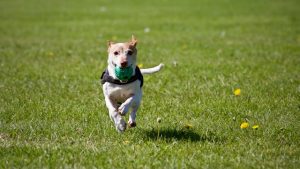Training a puppy can be a rewarding experience for both you and your new furry friend. One of the most effective and humane methods for puppy training is positive reinforcement. This approach not only helps in teaching your puppy obedience but also strengthens the bond between you and your pet.
What is Positive Reinforcement?
Positive reinforcement is a training method that focuses on rewarding good behavior instead of punishing bad behavior. When your puppy does something right, you reward them with treats, praise, or playtime. This makes them more likely to repeat the good behavior in the future.

Why Positive Reinforcement Works
- Builds Trust: Using positive reinforcement builds a trusting relationship between you and your puppy. They learn to associate training with positive experiences.
- Effective Learning: Puppies learn faster when they are rewarded for good behavior. They are more motivated to listen and obey.
- Reduces Fear: Unlike punishment-based methods, positive reinforcement doesn’t create fear or anxiety in your puppy. They feel safe and confident, which makes training more effective.
- Long-Lasting Results: Behaviors learned through positive reinforcement are more likely to stick. Puppies remember and repeat behaviors that are rewarded.
Steps to Train Your Puppy with Positive Reinforcement
- Start Early: Begin training your puppy as soon as you bring them home. Early training helps establish good habits from the start.
- Use High-Value Rewards: Find out what motivates your puppy the most. This could be treats, toys, or praise. Use these rewards to reinforce good behavior.
- Be Consistent: Consistency is key in puppy training. Make sure everyone in the household is on the same page and uses the same commands and rewards.
- Keep Training Sessions Short: Puppies have short attention spans. Keep training sessions brief (5-10 minutes) to keep them engaged and avoid frustration.
- Be Patient: Training takes time. Be patient with your puppy and celebrate small victories along the way.
Key Commands to Teach Your Puppy
- Sit: Hold a treat above your puppy’s head and slowly move it back. As their head follows the treat, their bottom will naturally lower. Say “sit” and reward them when they sit.
- Stay: Once your puppy has mastered “sit,” you can teach “stay.” Have them sit, then say “stay” while holding your hand up like a stop sign. Take a step back and reward them if they stay put.
- Come: Use a cheerful voice and say “come” while gently pulling on their leash. Reward them when they come to you.
- Leave It: Place a treat in front of your puppy and say “leave it.” When they resist the treat, reward them with a different treat or praise.
K9 Dog Obedience and Training in Sydney
For those in Sydney looking to enhance their puppy’s training, professional k9 dog obedience training can be a great option. Sydney offers various dog obedience schools and trainers who specialize in k9 training. These professionals can provide personalized training programs tailored to your puppy’s needs.
Benefits of Professional Dog Obedience Training in Sydney:
- Expert Guidance: Professional trainers have the knowledge and experience to address specific behavioral issues and teach advanced commands.
- Structured Environment: Training sessions are structured and consistent, providing an ideal learning environment for your puppy.
- Socialization Opportunities: Group classes offer a chance for your puppy to interact with other dogs, which is essential for their social development.
FAQ Section
Q1: What age should I start training my puppy?
A: You can start training your puppy as early as 8 weeks old. Early training helps establish good behaviors from the start.
Q2: What if my puppy doesn’t respond to treats?
A: If your puppy isn’t motivated by treats, try using toys, praise, or playtime as rewards. Find what excites your puppy the most.
Q3: How long does it take to train a puppy?
A: Training duration varies for each puppy. Consistent training over several weeks to months typically yields good results. Patience and persistence are key.
Q4: Can I use positive reinforcement for all behaviors?
A: Yes, positive reinforcement can be used for teaching all behaviors, from basic commands to complex tricks. It’s an effective and humane training method.
Q5: Do professional trainers in Sydney use positive reinforcement?
A: Many professional trainers in Sydney use positive reinforcement as it is proven to be effective and humane. It’s best to ask trainers about their methods before enrolling in a program.
Positive reinforcement is a powerful tool in puppy training. By using rewards and praise, you can teach your puppy obedience and create a strong, trusting bond. Whether you’re training at home or seeking professional dog obedience training in Sydney, positive reinforcement will set your puppy up for success.